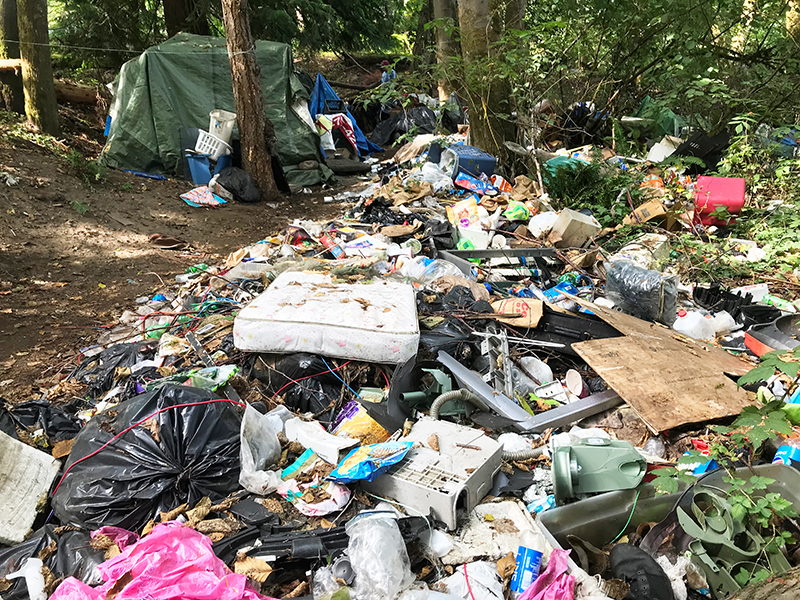
Washington state is experiencing the fifth-highest per-capita rate of unsheltered homelessness in the nation. Homelessness is a complex problem that affects everyone living in Washington and has become a significant issue for local governments in urban and rural areas on both sides of the Cascade Mountains. On any given night, 10,000 Washington residents are living outside or in places unfit for human habitation.
Along highway right-of-ways, there's been a steady increase in homeless encampments that present a significant safety risk to occupants, neighboring residents and businesses, passing motorists, and highway workers. This increasing homeless activity also impacts the environment. Illegal disposal of garbage and human waste can contaminate the environment, spread disease, and attract vermin.
As Gov. Inslee takes steps to provide people experiencing homelessness access to shelter and services, there's also a need to clean up abandoned encampments to protect people and the environment.
Governor seeks funding to address homeless problems
The supplemental operating and capital budgets proposed by Gov. Inslee provide $146 million in immediate funding, and $300 million over the next three years to decrease the rate of unsheltered homelessness in Washington. Gov. Inslee’s proposed budget also includes $4 million a year for encampment cleanup in each of the fiscal years 2021 and 2022. This means that a total of $8 million would be available to clean up solid waste and contaminated materials associated with homeless encampments.
Day to day, local governments are primarily responsible for finding solutions to the homeless crisis, including Solid waste is an inevitable result of most homeless encampments and collects in whatever is available, including shopping carts. No garbage removal service is available to take it away.
To support communities experiencing the impacts of the homeless crisis — if the governor’s budget is enacted by the Legislature — we will use $1.5 million of the $4 million provided during Fiscal Year 2021 for grants to local governments to remove solid, hazardous, and infectious waste generated by homeless encampments.
The funding will be distributed through a competitive grant process. We're working with local governments that participate in the Local Solid Waste Financial Assistance Program to develop the guidelines and criteria for funding disbursement. These grants will require a 25% match from local recipients.
The remaining $2.5 million provided in Fiscal Year 2021 would be used to clean up trash from vacated homeless encampments along the I-5 corridor. We plan to partner with the Washington State Department of Transportation and local communities to identify and eliminate contamination hot spots, especially in areas where significant environmental or human health threats exist.
As the state and local communities take meaningful steps to provide options for people experiencing homelessness, we're also looking to reduce the impacts of environmental contamination to protect all Washington residents, including those affected by homelessness.


